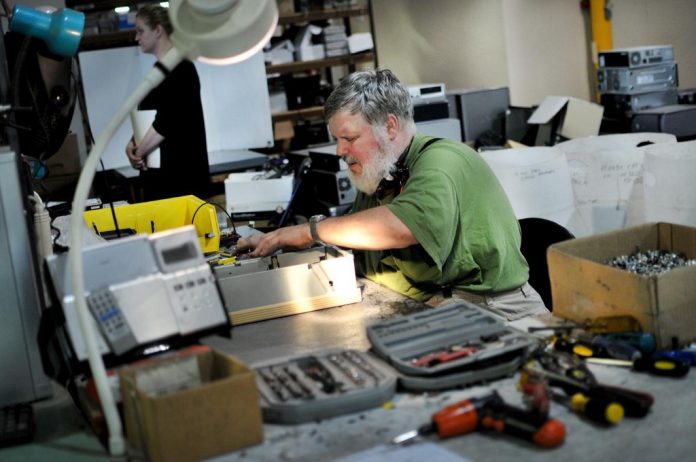Jim Caldwell disassembles computers and reassembles their parts into working machines. MARIA POUCHNIKOVA / TIMES PHOTO
— At Independence Industries, people who are visually impaired rebuild computers from recycled parts, and put them up for sale.
Jim Caldwell can see how valuable Independence Industries is to people in the Northeast and the entire Philadelphia region, even though his eyes can barely make the distinction between dark and light.
Independence is the local subsidiary of Lancaster-based Susquehanna Association for the Blind and Vision Impaired, a non-profit organization that provides rehabilitation, early childhood education, employment training and other services to the blind and vision-impaired.
Independence operates a series of vocational programs from a Drummond Road warehouse near Northeast Philadelphia Airport. Perhaps none of its activities are more publicly visible than its e-Cycle program, which rounds up truckloads of discarded computer equipment for recycling or refurbishment and resale on the second-hand market.
Independence sells the machines on site and also conducts several collection events and sales each year outside the factory.
“I think we did over four-hundred-thousand pounds (of computers) that were kept out of landfills last year,” said Steve Lebano, the plant manager for Independence Industries.
Despite his sight challenges, Caldwell works hands-on in the computer department. He disassembles incoming computers and helps reassemble the best parts into new working machines. He’s been in the job for three years and been with Independence for five years.
“I’m going to keep coming up here until this place doesn’t exist anymore or I don’t,” said the 56-year-old Wyncote resident, who commutes on his own each day by bus.
“Since the 1970s, I’ve worked in electronics. I have a ham radio license and worked in radio for fifteen years. So it’s nice I have a chance to work on electronics,” Caldwell said.
About 35 people work at Independence. Of those, about 30 are vision impaired.
The e-Cycle program employs a handful, while another department manufactures designer ceramic tile for Inglenook of Lancaster.
Elsewhere in the building, some workers make file folders and report covers, while others perform contract management services for the federal government. Those folks are supposed to check that federal vendors fulfill the requirements of their contracts.
“This (site) is more service-oriented. It’s us giving people who are vision impaired an opportunity for meaningful employment,” said Megan Sofilka, vice president and chief development officer for Susquehanna. “(But) it’s not like a sheltered workshop.”
Employees make better than minimum wage and are eligible for health benefits and vacation time. Proceeds generated from business activities here support Susquehanna’s rehabilitative and educational functions.
So do sales at the “retail” computer store. The store really is a corner of the warehouse featuring enough shelves to stock several dozen working systems at any given time.
The pricing scheme is pretty simple. Customers can buy a desktop unit with Windows XP operating system, keyboard, mouse and cables for $125. Windows 7 systems sell for $150 each.
“It doesn’t matter what (components) are in it,” Lebano said.
Monitors are separate. Flat screens go for $35 for a 17-inch model or $45 for a 19-inch.
“So you can have a nice set-up for two-hundred dollars,” Lebano said during a recent tour of the shop. “I sold about a thousand dollars worth yesterday.”
Some lesser-priced components, like speakers and surge protectors, are available in a $5 bin at the shop and in the shop’s eBay store.
The shelves are stocked on a rolling basis, so there is no dedicated shipment day. Computers are guaranteed for a week. If one breaks down before then — and there’s no evidence of abuse — Independence will try to fix it or provide a replacement machine. Caldwell and his colleagues put only sound computers up for sale.
“I’ve had mine for three years,” Sofilka said.
“They are the cream of what we get,” Lebano said. “They’re all Pentium 4 processors, dual-core and quad-core.”
Hard-drive security is of primary concern to Noah Reed, one of the PC technicians. Whatever enters the building doesn’t leave the building. Drives are wiped clean and reformatted or destroyed, depending on their reusability. A 40-gigabyte drive is the smallest that Reed will repurpose.
“Nothing comes out of here the way it came in,” he said.
The trashy computers account for about 95 percent of donations and end up in the recycling bins. In large volume, they can be quite profitable.
Some older microchips have gold in them and can be scrapped for $80 per pound. Other circuit boards sell for less. Aluminum or copper heat sinks are also considered prime scrap metals.
Even the metal boxes or shells that enclose the computer can be resold for pennies per pound.
Every day, trucks deliver new supplies to the shop. Businesses donate about 90 percent of the old computers. A couple times a year, Independence holds collection events in area shopping centers as a promotional tool and convenience to home computer users. It also has a pair of tent sale promotions each year — one in the spring, another in the fall — along with a holiday season sale each year. ••
For information about donating an unwanted computer or purchasing a refurbished one, call Independence Industries at 215–205–4116.





